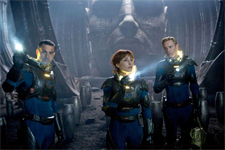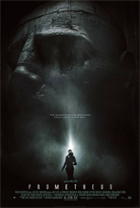Prometheus
|  With Prometheus, Ridley Scott finally leaves behind the realms of fantasy, war, and historical spectacle to return to science fiction, the genre that launched his international reputation three decades ago. Alien (1979) and Blade Runner (1982) are arguably two of the most prescient, original, and influential science fiction films of the modern era, so it should come as little surprise that Prometheus essentially blends the aesthetic and thematic DNA of those two films: Alien’s xenomorphic riff on slasher and haunted house movies and Blade Runner’s postmodern questioning of identity, humanity, and origins. The result is hardly a perfect film, but it is a would-be summer blockbuster of intense ambition and visual grandeur, merging metaphysical speculation with healthy doses of gooey-horrific imagery and high-tension suspense. It simultaneously feeds both our inner philosophy major and junk-movie aficionado. With Prometheus, Ridley Scott finally leaves behind the realms of fantasy, war, and historical spectacle to return to science fiction, the genre that launched his international reputation three decades ago. Alien (1979) and Blade Runner (1982) are arguably two of the most prescient, original, and influential science fiction films of the modern era, so it should come as little surprise that Prometheus essentially blends the aesthetic and thematic DNA of those two films: Alien’s xenomorphic riff on slasher and haunted house movies and Blade Runner’s postmodern questioning of identity, humanity, and origins. The result is hardly a perfect film, but it is a would-be summer blockbuster of intense ambition and visual grandeur, merging metaphysical speculation with healthy doses of gooey-horrific imagery and high-tension suspense. It simultaneously feeds both our inner philosophy major and junk-movie aficionado.Prometheus’ status as an “official” prequel to Alien is as slippery as the implications of its plot and are probably best left to the fanboys who are already filling up terabytes of storage with their online debates regarding how the details of the two films do and do not match up. Suffice it to say that they are related, although Prometheus’ primary pleasures lie less in how it sets the stage for Ellen Ripley’s encounter with the acid-bleeding, dual-mouthed alien marauder from Scott’s original film and more in its own probing into that most vexing of metaphysical questions: Where did we come from? Prometheus, unlike Alien, is pure science fiction to the extent that it uses its futuristic setting and advanced technology to dig into the deepest of questions regarding humanity and its place in the universe, and if it ultimately fails to answer all the questions it raises, it is only because those questions are much more than any one film could possibly hope to settle. For those who are game, it prods us to think beyond its borders. Following a prologue set millions of years ago, the story takes place in the near-distant future of the early 2090s, where we meet two scientists, Elizabeth Shaw (Noomi Rapace) and Charlie Holloway (Logan Marshall-Green), discovering ancient cave paintings in rural Scotland that appear to show a giant behemoth pointing toward a constellation of stars. Because this particular painting has appeared in the art of virtually every ancient civilization, they believe it is evidence of alien visitation to Earth. Several years later, with the funding of aging corporate titan Peter Weyland (Guy Pearce), Shaw and Holloway are travelling light years in the titular spaceship Prometheus to an Earth-like planet in the distant constellation depicted in the cave paintings with the hope that they will encounter the alien race that they believe created humanity. The voyage is overseen by Meredith Vickers (Charlize Theron), a chilly corporate representative with no scientific interest or imagination, and David (Michael Fassbender), a flaxen-haired android created by Weyland whose seemingly benign demeanor is undercut by his HAL-like vocal cadences, which are amusingly modeled on Peter O’Toole in Lawrence of Arabia (Fassbender, who was so intense and unhinged in Shame, is quite impeccable in playing the uncanniness of simulated human behavior). Thus, the mission in Prometheus is nothing less than humanity’s search for its creator, which gives the film a tricky theological underpinning. There is much discussion about the nature of belief, particularly Elizabeth’s holding fast to her father’s faith, which is literalized in the cross she wears around her neck, by refusing to give up even when faced with the apparent confirmation that humans were created not by God, but by an alien race (“But who created them?” she asks quite rightly). The characters aren’t particularly interesting in and of themselves, but they act as intriguing mouthpieces for different philosophies. Elizabeth is the idealized humanist-scientist who wants to find answers, but isn’t convinced that science will always provide them, while Charlie is the overly rationalist scientist who thinks that everything can be solved in one fell swoop; his condescending and simplistic attitude toward the nature of creation is evidence of his own spiritual limitations. Meredith Vickers, on the other hand, plays the role of the vacuous capitalist, uninterested in anything unless it turns a profit, while David stands as the product of that mindset, created in humanity’s image, but endowed only with the desire to serve his creator. The little flickers of understanding and emotion that pass across Fassbender’s face from time to time (he looks visibly wounded when Charlie cruelly reminds him that he’s “not a real boy”) suggest technology escaping its creator’s intention, and the fact that he (like HAL in 2001) becomes the most interesting and complex character provides a fascinating paradox the film never quite resolves. And, lest it begin to sound like Prometheus is all philosophical and theological, I should also mention that it includes some truly grisly imagery that continues and expands on the Alien series’ obsession with phallic, vaginal, and uterine imagery. The film’s various creatures are drawn directly (almost to the point of parody) from human genitalia, filling the screen with nightmarish snaking phalluses and a litany of vagina dentata. Scott again draws on the fears of both bodily penetration and expulsion that were at the heart of Alien, particularly in a squirm-inducing sequence in which Elizabeth must climb inside an automated surgical unit to have something extremely foreign extracted from her abdomen. The blood and viscera have a physical and a philosophical charge, suggesting a Cronenbergian refusal to separate mind and body. The fact that Scott manages to keep the film’s themes afloat amid the impressive (and imposing) production design and impeccable CGI is a feat in and of itself, although the film’s real impact will only be felt in how long after the final credits we’re still debating its implications. Copyright ©2012 James Kendrick Thoughts? E-mail James Kendrick All images copyright © 20th Century Fox |
Overall Rating: 


 (3.5)
(3.5)


